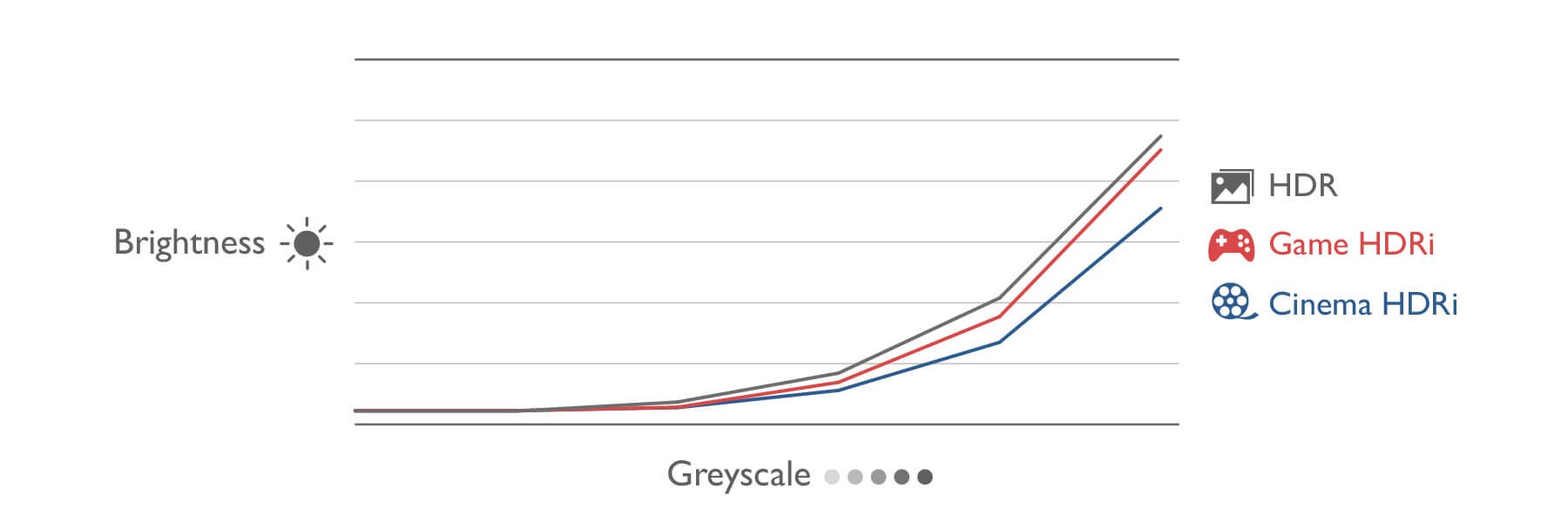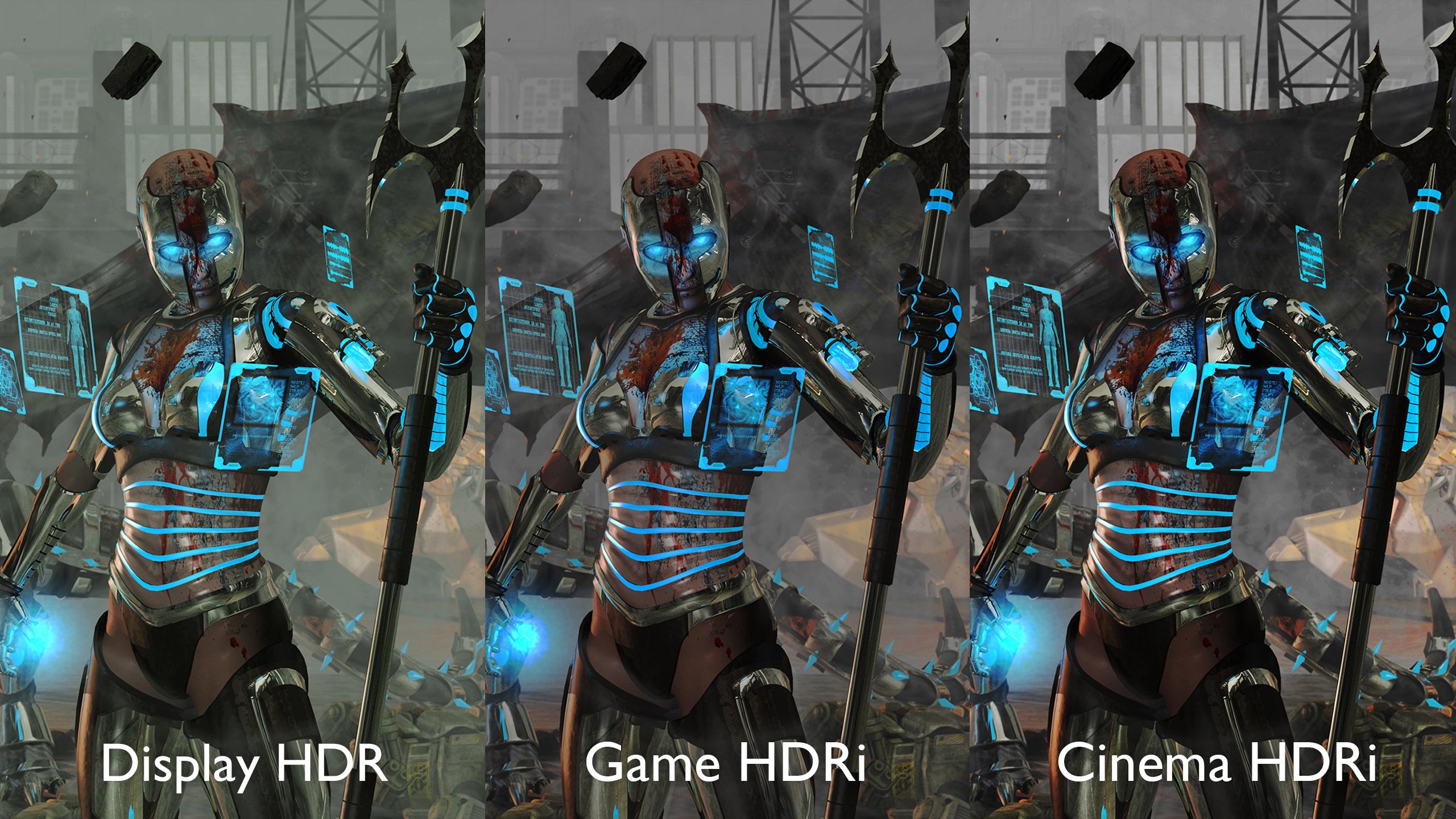

This article explains the difference between HDR and proprietary BenQ technology HDRi. Every time you turn around there are new features in technology, represented by some combination of letters and numbers, that you’re assured will improve your life. If you’re like most people, you have three questions: is this actually a big deal? Why? And do I need it? Let’s answer these questions and others about BenQ HDRi technology for monitors.
We all enjoy movies and games that keep us engaged, and don't want to spend our leisure time trying to figure out what we're looking at due to poor image quality. That's where HDRi comes in. Through a sensor mounted on the monitor and custom processing algorithms, rather than unresponsive HDR that remains the same no matter where you may be or what content you're enjoying, HDRi optimizes the HDR effect based on lighting conditions in your location. That leads to better viewing, helped by dedicated HDRi modes for gaming and cinematic content. There's also a neutral HDR mode, which basically turns HDRi off. Importantly, HDRi has the smarts to add high dynamic range to non-HDR content without exaggerating brightness or dark areas. Everything looks just right. HDRi elevates your screen time from ordinary to extraordinary.
HDR (high dynamic range) is an established family of standards that enables monitors to show brighter, more vivid images with increased color impact. This results in more realistic-looking content. Details are more refined and images appear more accurate than with standard dynamic range (SDR). Shadows appear with defined details instead of coming across as murky blotches of blackness that "crush" image content.

HDRi tunes HDR effect parameters based on ambient conditions and content type
BenQ HDRi is an intelligent, adaptive technology that gives your monitor HDR superpowers through reactive peak brightness and contrast adjustments that take place automatically.
If you turn on lights or open a window or just sit there as day turns into night, HDRi adjusts your HDR content to maintain optimal clarity and fidelity. This proprietary feature gets its edge from a barely noticeable sensor along the bottom of the display. That nearly invisible workhorse is paying close attention to your surroundings while you’re paying close attention to your screen. This is where the “intelligent” part comes in. The sensor detects changes in ambient lighting in your surroundings and what’s on your screen and adjusts image brightness, contrast, and color temperature. Images are clearer and with better color, and your eyes don’t have to strain to see them.
See? That’s a big deal.
This is where we get to that other important aspect of HDRi. Let’s look at your eyes while you're using a poorly-optimized monitor. You're straining to accommodate changes in lighting as details get washed out and overall image quality appears "off" and unnatural. This can lead to a variety of eye problems and impede productivity, not to mention make you feel quite awful.
Ailments that stem from computer use fall under the category of Computer Vision Syndrome (CVS). These problems run the gamut: headaches, blurred vision, eye strain, dry eyes, neck pain, and more. It’s no surprise that these problems lead to unpleasant, shortened sessions on your monitor that result in fatigue and frustration. Whether that worse experience is in homework, streaming, or gaming isn’t the point. The point is to eliminate the problem—even if the problem on your screen is caused, in part, by your environment.
You’ve probably noticed that changes in lighting around you impact the way your display looks. Maybe there’s a break in the clouds and suddenly your room is much brighter. Perhaps you’ve been playing or streaming for a bit and didn’t notice the sun going down. Either way, your monitor’s display is no longer suited to your environment. It’s possible you’ll observe this with your eyes. It’s more likely your eyes have noticed without you registering it. If only that could be fixed.
Think of HDR like any other workflow. You can either just take it as-is without any refinement and try to make the best of things, or you can apply intelligent adjustments. The difference between HDR and HDRi boils down to a basic workflow versus an intelligent workflow. An HDRi-equipped monitor customizes content to your space, your display, and your experience.
HDR raises brightness to show more detail. This, however, can wash out bright areas on your display. HDRi takes content and ambient lighting into consideration. By performing unique optimization for your content and your environment, HDRi delivers an ideal image. Colors are vivid, improved contrast assures much better detail, and you have the confidence of working on an intelligent display.
HDRi brightens dark regions on your display without overexposing bright areas, resulting in a more balanced image that is easier on the eyes in two ways
First, the eye-care benefits we’ve discussed.
Second, you can see more details, whether working or spotting opponents in competitive gaming.
You also don't miss cinematic plot points that unravel in shadows, a boon for movie and TV fans.


While HDRi benefits span most types of computer use, it is invaluable for gaming. Think of the edge you have when you can see everything on your display in vivid detail, and your opponents can’t. Now you understand HDRi.
Regardless of how you use your monitor and how long your sessions last, if you enjoy HDR-formatted content, HDRi is for you as it simply and efficiently gives you a better high dynamic range experience.
Like any new technology, seeing is believing. You can experience HDRi on these BenQ monitors.
{{title}}
We will notify you when we have more.
We will send you an email once the product become available.Your email will not be shared with anyone else.
Sorry, our store is currently down for maintenance.We should be back shortly. Thank you for your patience!